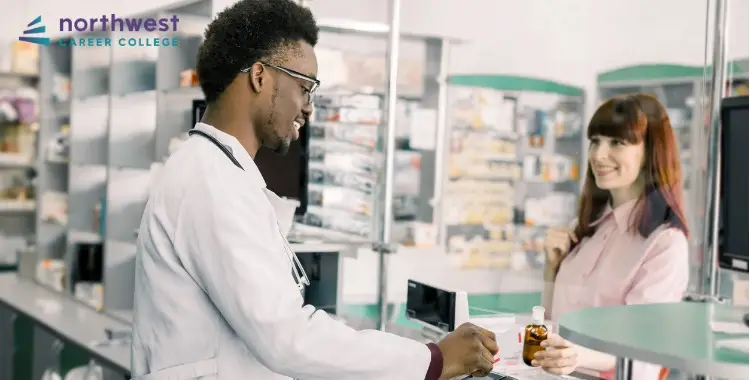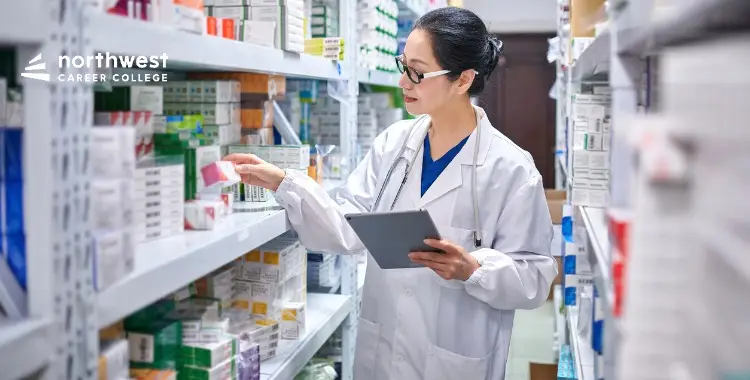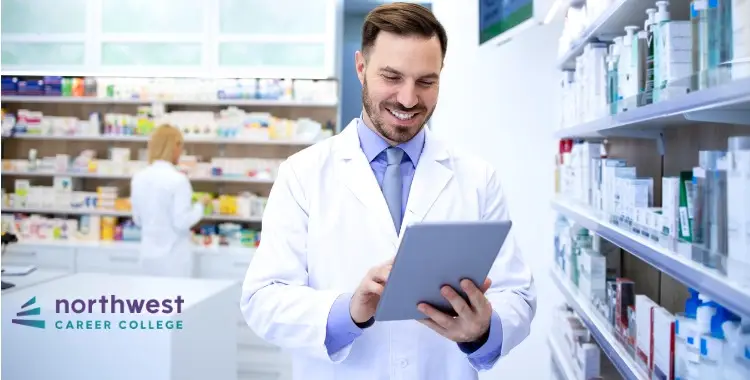What Are The Top 3 Responsibilities of a Pharmacy Technician?
- Pharmacy Technician
- April 25, 2024
- 2.1k views
- 4 min read

Responsibility refers to being accountable for one’s actions and duties and understanding the consequences of your choices and decisions. This is especially important for pharmacy technicians, whose responsibilities are essential to positive health outcomes for many patients.
Pharmacy technicians are one of the responsible parties to ensure the safety and security of their patients at all times. They are expected to fill prescriptions accurately and provide exact information on the medications issued, ensuring a safe and ordered atmosphere within the pharmacy premises.
This article will explore the top three responsibilities of pharmacy technicians, as well as the key tasks associated with those responsibilities.
Table of Contents
Pharmacy Technician Responsibilities
Medication Management
First, let’s talk about drug administration and medicine management. Pharmacy technicians must ensure with strict precaution that the right medicines in the appropriate dosages are dispensed to their patients. Here are three key responsibilities related to medication management:
- Filling prescriptions: This is the primary task that a pharmacy technician undertakes. They measure, count, and package medicines with great care and accuracy and according to the pharmacist’s instructions.
- Labeling and packing: After preparing the prescription, the pharmacy technician prints the labels and pastes them on the containers of medications with important information, such as the patient’s name, dosage instructions, and expiration date. Proper labeling will likely avoid any confusion or error for the patient during medication administration.
- Inventory control: The pharmacy technician also controls the inventory in the pharmacy. They maintain a complete record of the level of drugs stocked, order supplies when necessary, and rotate older stock to the front of the shelf so that medications do not expire.
Patient Interaction
A patient’s initial interaction with a pharmacy technician typically occurs when they drop off their prescription, pick up their prescribed medication, or seek guidance about the medication being dispensed. Here are three examples of how such professionals may interact with patients:
- Assisting in answering questions: Patients’ questions may include how or when to take medicines, their side effects, or interactions with other medicines. Pharmacy technicians receive direction on providing general information and counseling to patients, turning to pharmacists to answer complex questions.
- Insurance processing claims: The pharmacy technician assists the patient in the insurance procedure for processing the prescription claim by explaining coverage details to the patient, informing the patient of their out-of-pocket expenses, and helping the patient to be in a position where they can decide regarding healthcare.
- Help customers: Last but not least, pharmacy technicians help customers by providing excellent customer service. They greet patients warmly, address patients’ issues politely, and ensure that everything is a good overall experience. Sometimes, they may help with non-prescription medication or health products.
Administrative Duties
Lastly, let’s talk about the administrative duties. This is another area of the most common responsibilities other than direct duties in the pharmacy for the technician. Techs also handle several administrative tasks to keep everything moving along. Here are three of the most common:
- Data Entry: Pharmacy Technicians enter the prescription details into the computer system, including information on the patient, directions to the drug, and insurance information. This step requires accuracy to ensure the proper medication is dispensed to the right patient.
- Keeping Records: Pharmacy Technicians also keep and update the proper records of the prescriptions that have been filled, the medicines dispensed, and the required information. This is important and integral documentation for regulatory compliance and may be used within the domain of audit processes.
- Ensuring Compliance: The pharmacy technician will ensure that the pharmacy observes all required laws, regulations, and industrial standards. These may include cleanliness and protection standards, proper medication handling, and protection of the patient’s privacy under all circumstances.
Conclusion
In conclusion, those are four primary duties that a pharmacy technician must perform as part of their job. These duties are essential in supporting a pharmacist and providing patients with high-quality care. Administrative functions are also part of their responsibilities in medicine management when working with patients.
If you’re an aspiring pharmacy technician, always remember that your work makes a real difference in the lives of your patients. You have the opportunity to be a vital part of the healthcare system, helping to ensure that people receive the medications they need to stay healthy. Keep up with your studies and training, and always strive to provide the best possible care to your patients.





